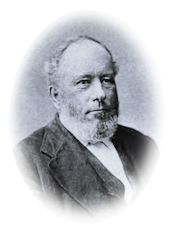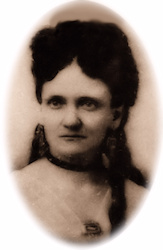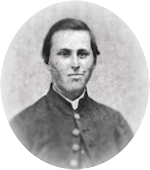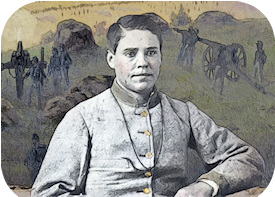The following complimentary orders were issued, as dated immediately after our going into camp at Eastpoint:
__________
Headquarters Dept. and Army of the Tennessee,
Eastpoint, Ga., September 9, 1864.
General Field Orders,
No. 16
It is with pride, gratification, and a sense of Divine favor that I congratulate this noble army upon the successful termination of the campaign.
Your officers claim for you a wonderful record—for example, a march of four hundred (400) miles, thirteen (13) distinct engagements, four thousand (4,000) prisoners, and twenty (20) stands of colors captured, and three thousand (3,000) of the enemy’s dead buried in your front.
Your movements upon the enemy’s flank have been bold and successful; first upon Resaca, second upon Dallas, third upon Kenesaw, fourth upon Nickajack, fifth via Rosewell, upon the Augusta railroad, sixth upon “Ezra Church” to the southwest of Atlanta, and seventh upon Jonesboro and the Macon railroad. Atlanta was evacuated while you were fighting at Jonesboro. The country may never know with what patience, labor and exposure, you have tugged away at every natural and artificial obstacle that an enterprising and confident enemy could interpose.
The terrific battles you have fought may never be realized or credited, still a glad acclaim is already greeting you from the government and people, in view of the results you have helped to gain, and I believe a sense of the magnitude of the achievements of the last hundred days will not abate but increase with time and history.
Our rejoicing is tempered, as it always must be, by the soldier’s sorrow at the loss of his companions-in-arms. On every hillside, in every valley throughout your long and circuitous route, from Dalton to Jonesboro, you have buried them.
Your trusted and beloved commander fell in your midst; his name, the name of McPherson, carries with it a peculiar feeling of sorrow. I trust the impress of his character is upon you all to incite you to generous actions and noble deeds.
To mourning friends, and to all the disabled in battle, you extend a soldier’s sympathy.
My first intimate acquaintance with you dates from the 28th of July. I never beheld fiercer assaults than the enemy then made, and I never saw troops more steady and self-possessed in action than your divisions which were then engaged.
I have learned that for cheerfulness, obedience, rapidity of movement, and confidence in battle, the Army of the Tennessee is not to be surpassed, and it shall be my study that your fair record shall continue, and my purpose to assist you to move steadily forward and float the old Flag in every proud city of the rebellion.
(Signed) O. O. Howard,
Major General.
(official)
Sam’l L. Taggart,
Ass’t. Adj’t. Gen’l.
__________
Headquarters Fifteenth Army Corps,
Eastpoint, Ga., September 11, 1864.
Officers and Soldiers of the Fifteenth Army Corps:
You have borne your part in the accomplishment of the object of this campaign, a part well and faithfully done.
On the 1st day of May, 1864, from Huntsville, Ala., and its vicinity, you commenced the march. The marches and labors performed by you during this campaign will hardly find a parallel in the history of war. The proud name heretofore acquired by the 15th Corps for soldierly bearing and daring deeds remains untarnished—its lustre undimmed. During the campaign you constituted the main portion of the flanking column of the whole army. Your first move against the enemy was around the right of the army at Resaca, where, by your gallantry, the enemy were driven from the hills and his works on the main road from Vilanaw to Resaca. On the retreat of the enemy, you moved on the right flank of the army by a circuitous route to Adairsville, in the same manner from there to Kingston and Dallas, where, on the 28th day of May, you met the veteran corps of Hardee, and in a severe and bloody contest you hurled him back, killing and wounding over two thousand, besides capturing a large number of prisoners. You then moved around to the left of the army, by way of Acworth, to Kenesaw Mountain, where again you met the enemy, driving him from three lines of works, capturing over three hundred prisoners. During your stay in front of Kenesaw Mountain, on the 27th of June, you made one of the most daring, bold and heroic charges of the war, against the almost impregnable position of the enemy on Little Kenesaw. You were then moved, by way of Marietta, to Nickajack Creek, on the right of the army, thence back to the extreme left by way of Marietta and Roswell, to the Augusta railroad, near Stone Mountain, a distance of fifty miles, and after effectually destroying the railroad at this point, you moved by way of Decatur to the immediate front of the Rebel stronghold, Atlanta. Here, on the 22d day of July, you again performed your duty nobly, “as patriots and soldiers” in one of the most severe and sanguinary conflicts of the campaign. With hardly time to recover your almost exhausted energies, you were moved again around to the right of the army, only to encounter the same troops against whom you had so recently contended, and the battle of the 28th of July, at Ezra Chapel, will long be remembered by the officers and soldiers of this command. On that day it was that the 15th Corps almost unaided and alone, for four hours contested the field against the Corps of Hardee and Lee.. You drove them discomfited from the field causing them to leave their dead and many of their wounded in your hands. The many noble and gallant deeds performed by you on that day will be remembered among the proudest acts of our nation’s history. After pressing the enemy closely for several days, you again moved to the right of the army, to the West Point railroad, near Fairburn–after completely destroying the road for some distance, you marched to Jonesboro, driving the enemy before you from Pond creek, a distance of ten miles. At this point you again met the enemy, composed of Lee’s and Hardee’s Corps, on the 31st of August, and punished them severely, driving them in confusion from the field, with their dead and many wounded and prisoners left in your hands. Here again by your skill and true courage you kept sacred the reputation you have so long maintained, viz.: “The 15th Corps never meets the enemy but to strike and defeat him.” On the 1st of September, the 14th Corps attacked Hardee, you at once opened fire on him, and by your co-operation his defeat became a rout. Hood, hearing the news, blew up his ammunition trains, retreated, and Atlanta was ours.
You have marched during the campaign, in your windings, the distance of four hundred miles, have put “hors-du-combat” more of the enemy than your corps numbers, have captured twelve stands of colors, 2,450 prisoners and 210 deserters.
The course of your march is marked by the graves of patriotic heroes who have fallen by your side; but at the same time It is more plainly marked by the blood of traitors who have defied the constitution and laws, insulted and trampled under foot the glorious flag of our country.
We deeply sympathize with the friends of those of our comrades-in-arms who have fallen; our sorrows are only appeased by the knowledge that they fell as brave men, battling for the preservation and perpetuation of one of the best governments of earth. “Peace be to their ashes.”
You now rest for a short time from your labors; during the respite prepare for future action. Let your country see at all times by your conduct that you love the cause you have espoused; that you have no sympathy with any who would by word or deed assist vile traitors in dismembering our mighty Republic or trailing in the dust the emblem of our national greatness and glory. You are the defenders of a government that has blessed you heretofore with peace, happiness and prosperity. Its perpetuity depends upon your heroism, faithfulness and devotion.
When the time shall come to go forward again, let us go with the determination to save our nation from threatened wreck and hopeless ruin, not forgetting the appeal from widows and orphans that is borne to us upon every breeze to avenge the loss of their loved ones who have fallen in defense of their country. Be patient, obedient and earnest, and the day is not far distant when you can return to your homes with the proud consolation that you have assisted in causing the old banner to again wave from every mountain’s top and over every town and hamlet of our once happy land, and hear the shouts of triumph ascend from a grateful people, proclaiming that once more we have one flag and one country.
John A. Logan,
Major General Commanding.
__________
Headquarters 4th Division, 15th A. C.
Eastpoint, Ga., September 13, 1864.
Officers and Soldiers:
The commander-in-chief, the department commander, and corps officer have each expressed to you their approbation of your conduct during the campaign just closed. They have spoken in general terms to the army, the department and corps.
It is my privilege to address your immediate organization. Your department commander announces the capture of four thousand (4,000) prisoners by the Army of the Tennessee. You have taken one-third of that number. This army has taken from the enemy twenty (20) battleflags; eight of these were wrested from him by your prowess.
Your lists of killed and wounded in battle are larger by one-half than any other division in the Army of the Tennessee.
You have destroyed as many of the enemy as any similar organization in the entire army.
You have never been defeated in this or any other campaign.
Your record is therefore spotless, and you should be and doubtless are proud of it. Your friends at home and the comtry at large will some day understand and appreciate your conduct.
Had your lamented department commander been spared, his familiarity with your history, and identification with yourselves, would have commanded for you more complete justice. Your corps commander is not now, nor has he ever been, slow to acknowledge your merits, but he is powerless to do more.
Your organization will probably soon be changed, and the stranger to you will reap the reward of your devotion and self-sacrifice. The just reward, always so highly prized by the true soldier, may not be yours, but the consciousness of duty well performed will remain with you forever. You will sustain your high reputation by doing battle, as heretofore, for your country, and not for men. Do so cheerfully. My connection with you as your division commander may possibly soon be severed. Support any future officer as you have supported me, and success must attend your efforts. I ask from you the same kind of remembrance I shall ever give to each true soldier of this command.
(Signed) William Harrow,
Brigadier General U. S. Vols.
__________
Explanatory Note. [The Army of the Tennessee remained at, or near, East Point, until October 4th. When General Sherman decided to destroy Atlanta, he gave the inhabitants their choice as to where they would go, either north, south, or remain, and take their chances in the ruined city. Prisoners captured during the campaign were also exchanged, and a detail of some 70 or 80 men from the regiment, commanded by Captain Wills, and a like command from the 100th Indiana, was given the duty of guarding the “neutral ground” at a place called Rough and Ready, some eight or ten miles south of Atlanta. This duty being performed, the detail rejoined the regiment, having been so occupied about ten days. The 4th Division was here broken up, and the “old 2d Brigade” was transferred to the 1st Division, commanded by Gen. C. R. Wood.]









